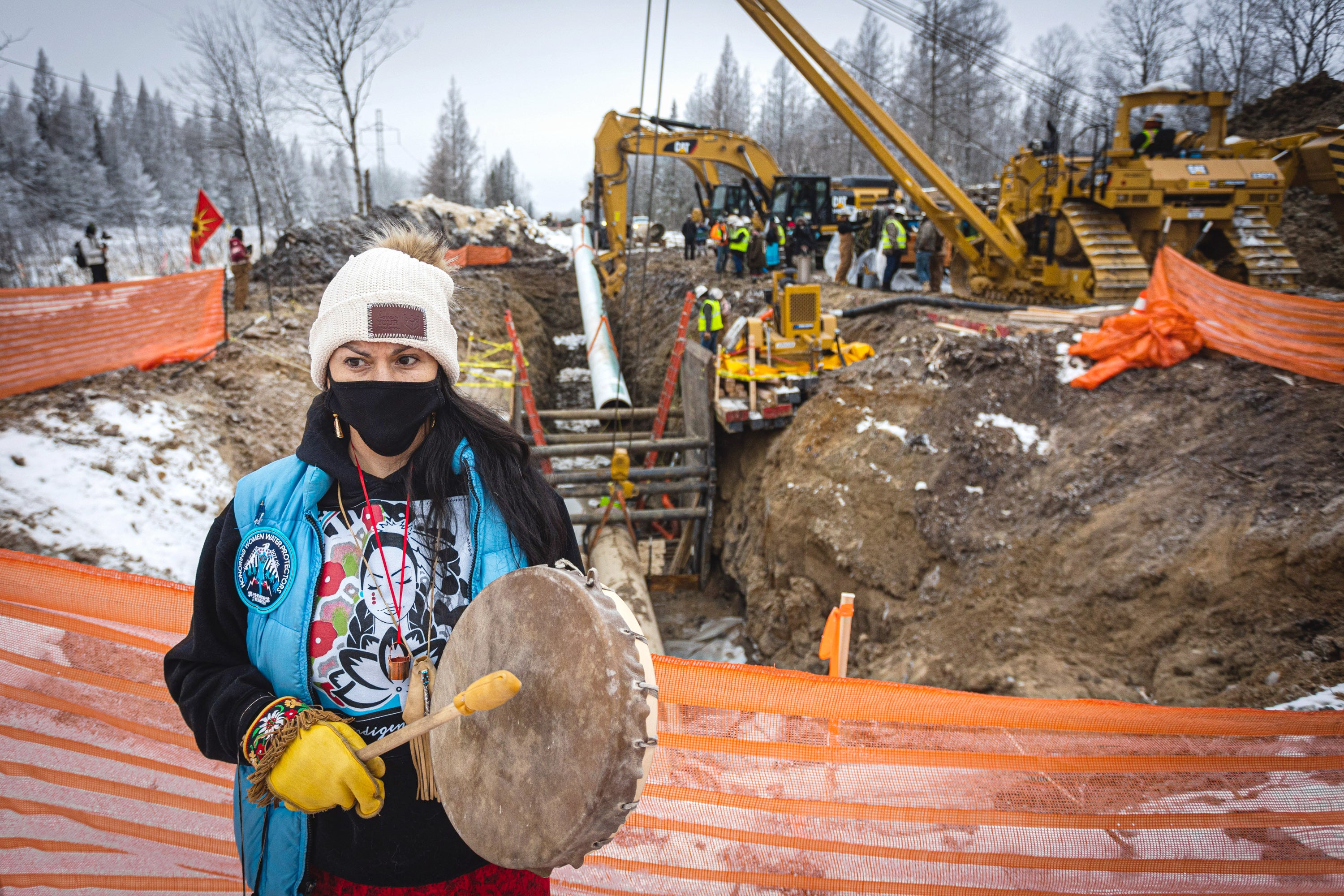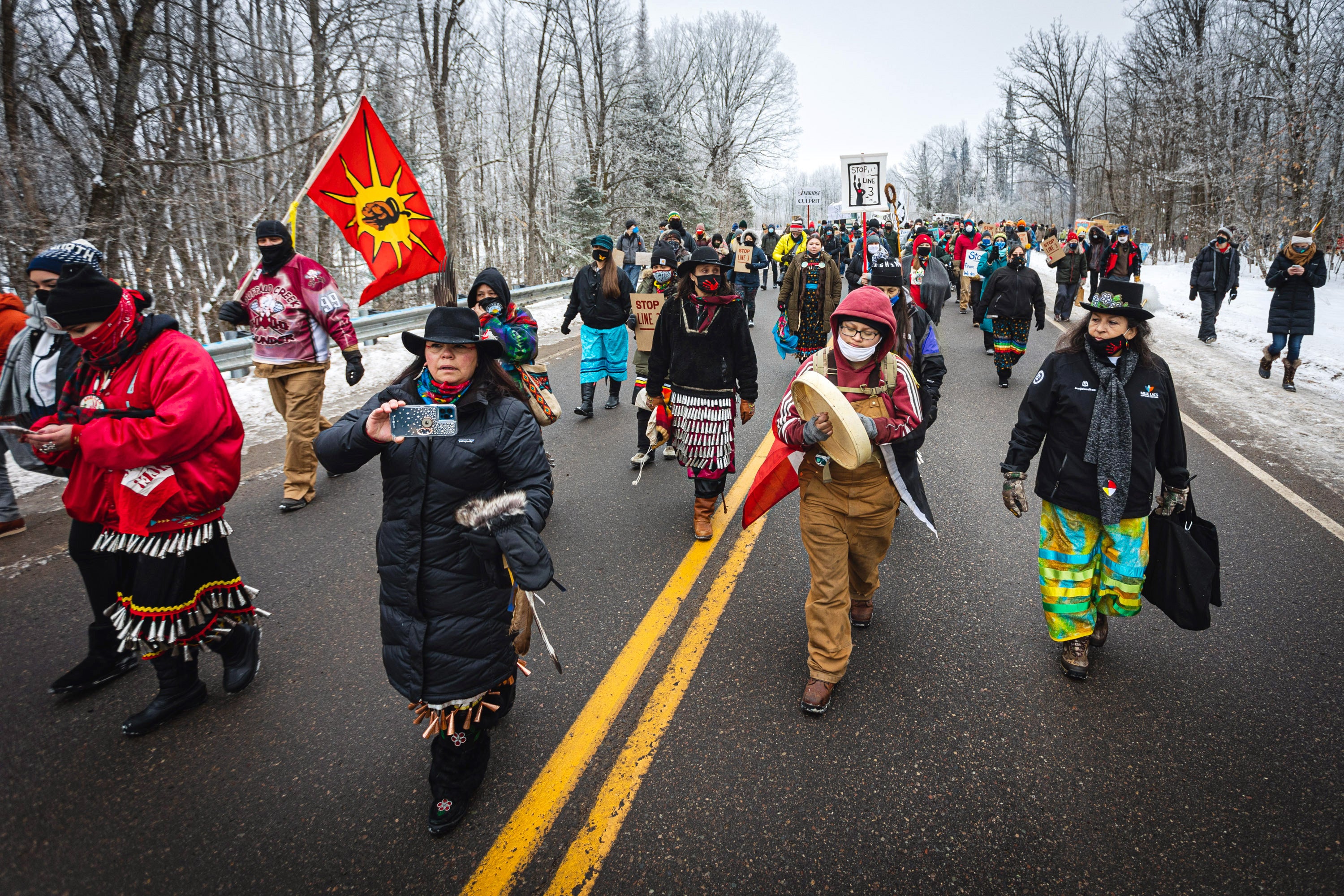
Gio Cerise, a member of the White Earth Nation, plays a drum and prays in front of Line 3 pipeline construction on Highway 169 south of Hill City, Minn.
For the Anishinaabe people of northern Minnesota, spring begins with hammering taps into the leathery bark of the sugar maple trees that blanket the region. Next comes sugar camp, where close-knit communities come together for the first time after the long, cold winter to harvest and produce the maple syrup that has been a dietary staple for centuries.
This year, however, spring signaled a different purpose for some Anishinaabe.
Nearly 200 water protectors came together to tap trees, participate in a round of snow snaking, and mobilize against the proposed construction of a massive, dangerous oil pipeline called Line 3.
The early March gathering continued the water protectors’ seven-year effort to stop Line 3 from being built in the heart of territory where Anishinaabe retain the right to hunt, fish, and harvest wild rice under an 1855 treaty. They called for thousands more water protectors to follow migrating trumpeter swans and journey north and help them defeat Line 3.

“We’ve been living here for 10,000 years, drinking the same water, tapping sugar from same trees for maple syrup, harvesting our wild rice,” said Winona LaDuke, executive director of Honor the Earth and a member of the White Earth Band of Ojibwe, during a recent digital rally to organize opposition to the pipeline. “It’s our most sacred place.”
The Line 3 pipeline — proposed by Canadian oil giant Enbridge to carry 790,000 barrels of tar sands oil per day — has been under construction since December, when Enbridge began removing vegetation, including mature trees, and digging trenches through wetlands and waterways, damaging land, water, and ecosystems that are part of the Anishinaabe heritage and key to their survival. The new pipeline path would cut directly through areas with some of the highest-quality wild rice stands in Minnesota.

Representing the Red Lake Band of Chippewa Indians, the White Earth Band of Ojibwe, Honor the Earth, and Sierra Club, Earthjustice is fighting the pipeline in federal court. We’re arguing that the U.S. Army Corps of Engineers broke the law by giving the pipeline a permit without evaluating how the pipeline could irrevocably damage the wetlands and waterways in northern Minnesota, including by causing an oil spill that could devastate the Tribes and their resources.
The fight against Line 3 is one of several fights to stop the development of new fossil fuel infrastructure — including the Dakota Access pipeline and the Line 5 pipeline — which would lock in decades of rising climate pollution at a time when we cannot afford any more.

“We’re at the end of the tar sands era — all the investors are bailing out of the tar sands. This is an idea of colonialism from the last century,” said LaDuke. “We need to move on. I want pipelines but I want pipelines that carry water for places like Flint, Michigan. Let’s make pipelines for the people.”
Throughout the long winter, more than 130 water protectors were arrested for civil disobedience.

“For months now, we’ve been taking steady, constant direct actions to delay the construction of Line 3. In the freezing cold of a Minnesota winter, people have crawled into pipes, stood in front of excavators, engaged in tree-sits, climbed 40ft bi-pods, delayed construction with prayers, and locked to pianos to block bulldozers,” Tara Houska, a member of the Couchiching First Nation Anishinaabe, a tribal attorney, and Campaigns Director of Honor the Earth, wrote in a March 8th update. “At the same time, the climate criminals are free to keep bulldozing through my peoples’ sacred lands.”
As the fight to stop Enbridge continues in court, the protestors plan to keep using creative tactics to bring things to a halt in the short term.
“It is physically painful to witness the land being ripped apart, to see our sacred manoomin (wild rice) being irrevocably harmed by a corporation that cares for nothing but profit,” Houska wrote. “It is also deeply powerful to stand with those putting their bodies on the line to defend the land.”
They’re also appealing to policymakers to put a stop to Line 3.
“This cannot pass any climate test. The equivalent of adding 50 coal-fired power plants is not anything we want,” LaDuke said. “We’re asking you to intervene. What we want is leadership and that leadership is the just transition [to clean energy]. We’re ready.”
Enbridge announced this month that it will pause construction because of muddy conditions and resume in May.
